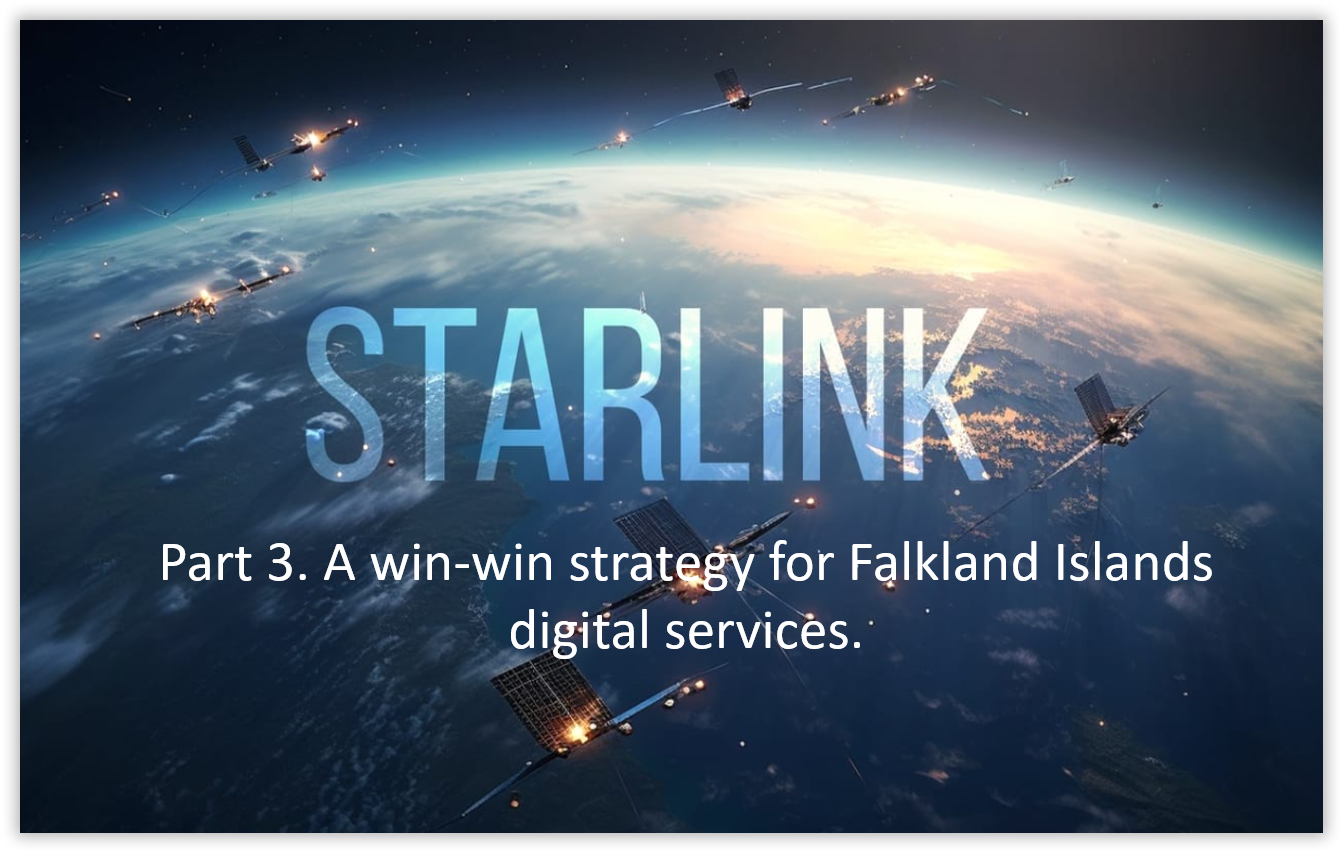
In Part 1, The Ascension Island Story, I outlined the history of Starlink adoption on Ascension Island. Part 2, The Falkland Islands Enigma, focused on the Starlink situation in the Falkland Islands. Part 3 broadens things by proposing a workable digital service strategy that provides a win-win solution for consumers, businesses, FIG, and Sure Falkland Islands.
The Falkland Islands deserve a visionary, deliverable, and affordable strategy for digital services. I believe this is it, and it is not just about Starlink’s adoption. It will happen with support from all parties, as I believe that the early adoption of Starlink and renegotiation with Sure about the supposed subsequent reduction in revenue are now inevitable.
If you just want to see the proposed strategy, skip to the end. First, I’d like to re-present some of the relevant issues and opportunities previously discussed on OpenFalklands.
Sadly, the issues and opportunities described in the posts below have not been seriously considered or implemented. Moreover, many knowledgeable Falkland Islanders I have talked to over the years agree with me and have been proposing them since the mid-2010s. These posts describe some of the actions that could be implemented locally to improve digital services in the islands.
|
|
♦ THE ENIGMA OF THE FALKLAND ISLANDS NATIONAL BROADBAND sTRATEGY.♦ NATIONAL BROADBAND STRATEGY – WHAT IS IT, INDEED, WHERE IS IT HEADING? |
Observation: The myopia of only focusing onLY ON BROADBANDdownload speeds is inadequate |
|
I wrote back in 2019 that : “I was pleased when I first heard about the desire to create a National Broadband Strategy for the Falkland Islands. In so many ways, it is great that such an ambition should be tackled but I can’t help thinking that the scope lacks ambition? Even the name is self-limiting by only focussing singly on broadband download speeds.
This demonstrates a distinct lack of understanding of what the Internet is really about. The Household User Habits survey, which closed on March 31st, 2019, was a starting point. According to the Falkland Islands Regulator’s web site:
“This survey is gathering information on how consumers use the internet now, and aspirations for the future. The results of this survey will contribute to calculating the international connectivity demands of the Falkland Islands providing a clearer picture of what a ‘typical household’ requires.
As laudable as this might seem, I believe that focusing on increasing satellite capacity alone only addresses a part—a not insignificant part—of the digital services strategy that needs to be implemented.
Unfortunately, I don’t believe a visionary digital services strategy has ever been created or made public. All that activity only justified the increase of Sure’s satellite capacity and led to FIG subsidising additional satellite capacity by £1m+ per annum. This was not bad, but a digital strategy is not just about the speed of Internet access services like Starlink and OneWeb. ISPs are NOT the Internet. Although ISPs are key in providing Internet services, they only provide access. What about digital services in the Falklands? This has not changed in 20 years beyond the increase in satellite capacity.
|
|
♦ The enigma of the monthly Internet usage quota. |
Observation: International and local Internet traffic must be separated |
|
The key questions I posed in this post were: “Why is there a usage quota?” and “What is it needed?” Even with the aid of the Falkland Islands’ Government £1m+ per annum subsidy, Sure’s current level of satellite capacity is insufficient to provide a slow at best Internet service for businesses and consumers. No matter how much money is thrown at it, this will always be true.
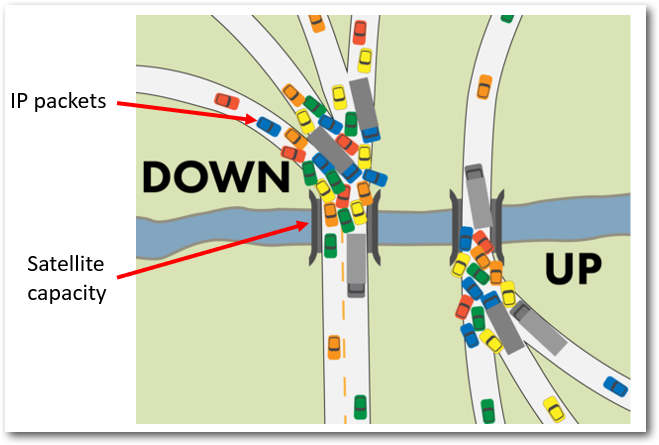
To ensure a fair usage policy with this limited satellite capacity, Sure must throttle (technically called ‘traffic shaping’) the amount of IP traffic transiting the satellite at times of high congestion. In practice, this results in a perceived reduction in download speeds. The second key policy to reduce congestion is disincentivising consumer and business Internet usage through crude usage quotas. Using these two policies is necessary to prevent a collapse of Sure’s satellite connection at times of high congestion.
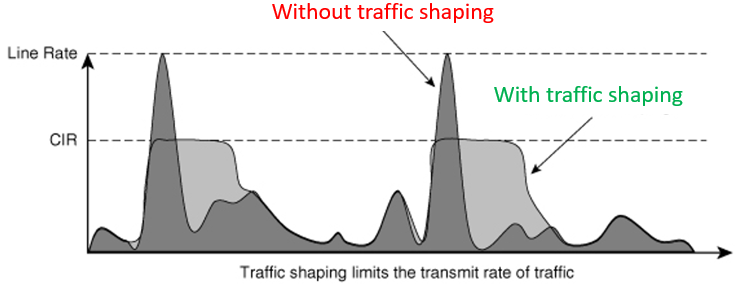
I and many others have asked this question time and time again over the years: “Why is the quota applied to local IP traffic that does NOT transit the Intelsat satellite?” It should not. Domestic traffic should be quota-free to incentivise the creation of local digital services. This is what the Internet is about. Sure have stated that they would have to replace or considerably upgrade their operational and billing systems, which would be too expensive. This is not a good reason not to do something that negatively impacts local digital services. This is probably not the case, as billing systems used by telecommunications operators worldwide can manage this.
Such a policy would significantly benefit local Internet businesses wanting to provide digital services such as local gaming and data backup. Current quotas are way too low for anyone to host a business server, and don’t forget, quotas would apply to both ends of a local backup service!
|
|
♦ THE VISION OF A HIGH-SPEED LOCAL INTRANET ON THE FALKLAND ISLANDS. |
OBSERVATION: The creation OF a local intranet should be at the heart of a digital strategy |
|
Developing a high-speed private intranet would represent a major visionary step for the Falkland Islands. Still, it would require commitment, investment, and effort from all the islands’ stakeholders. This concept is not new; it has been discussed many times or proposed over the years. Indeed, several prospective MLAs discussed this capability in their manifestos in late 2017.

The ‘core’ of the high-speed local network would consist of a ring of 10GHz fibre-optic cable laid underground or on overhead poles around Stanley. Overhead poles would be the lowest-cost approach. A ring means that if the fibre is broken, there will be ‘resilience’, and services will not be lost. Fibre optic cables are already used in Stanley and run along Ross Road, Davis Street, and MPA Road.
A local network would enable local communication even if there was an international connectivity blackout. The government and private businesses could offer multiple digital services, and their use would be as fast as experienced in any other country.
Local consumer services include disaster recovery, Camp education and tuition, Home-working, Health care and remote diagnosis, Utility payment and usage, E-payments, Passport and Immigration, Visitor promotion, Mount Pleasant airport, etc. Certainly, MiPlayer and KTV streaming services could be hosted on it.
Local business services include private IP-VPNs, multi-premises intranets, Remote access, Data backup, VoIP services, Home working, Real-time messaging and chat, Video conferencing, Financial services, and E-commerce, etc.
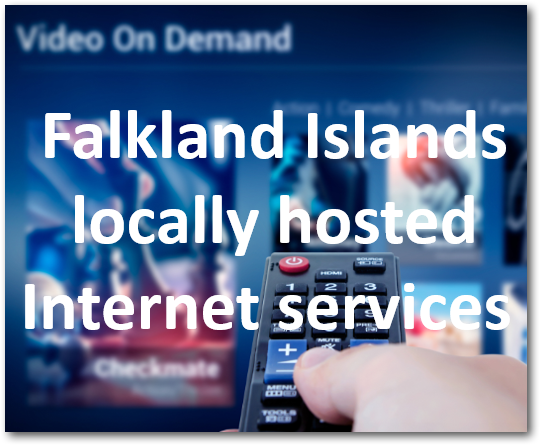 |
♦ Falkland islands’ locally hosted internet services |
Observation: Locally hosted Internet services are legal and do not break Sure’s communications monopoly. |
|
An OTT (Over-the-top service) (Apps, in other words) is ANY service supplied that runs over the Internet or local intranet described above.
The principle objective of any digital strategy is to encourage and enable the creation of an appropriate infrastructure in the form of an intranet and the development of local entrepreneurial start-up companies. In the Falkland Islands, this is none other than website editing. A major contributing factor was that it was wrongly believed and rumoured that these would break Sure’s communication monopoly. That is still very much the case from what I hear. Certainly, the government and consultants’ lack of vision of the opportunities also contributes significantly.
In 2020, I looked at all the published Falkland Islands Government (FIG) papers concerning the Communications Ordnance and the exclusive Individual Operating Licence signed by Sure South Atlantic and FIG in 2017. I wanted to fully understand what Sure’s ‘Exclusive Agreement’ meant concerning providing local OTT services on Sure’s local network.
In short, local OTT services such as data backup services are legal in the islands, as confirmed by the Attorney General in 2020:
“Without straying into giving any legal analysis or opinion, it is obvious that over the top services such as those I have mentioned, are not prohibited by the exclusive licence held by Sure. Nor do the operators of such services require any licence from the Falkland Islands Government or Communications Regulator to do so”.
I wrote many letters to the Regulator, FIG, and Sure, which were all sadly ignored as can be seen in the post itself.
 |
♦ BUSINESS CONTINUITY, VSATS AND THE LAW OF UNINTENDED CONSEQUENCES♦ AN OPEN EMAIL TO MLAS ABOUT THE IMPACT OF VSAT LEGISLATION ON BUSINESSES♦ DECEMBER 2019 INTERNET ‘PLANNED’ OUTAGE. |
The importance of business continuity services and resilience. |
|
With two significant Internet outages in April and November 2019 and others as recently as last year, Falkland Islanders know all too well the serious consequences of an unavailable Internet. I’ll always remember the November outage, which saw the only local bank closed for the day, with a queue of customers outside the entrance and the non-working Point of Sale terminals in the local supermarkets. It was down to luck that a cruise ship was not due that day.
No amount of post hoc redress can compensate for the downright inconvenience consumers and businesses experienced.
I was concerned that during the year of activity around the creation of the National Broadband Strategy, which seemed to die a public death, there has been radio silence about the reliability of the Falkland Islands’ Internet service and how businesses can be made more resilient to Internet blackouts. With a local intranet, at least some local services could still function.

A win-win digital services strategy for the Falkland Islands
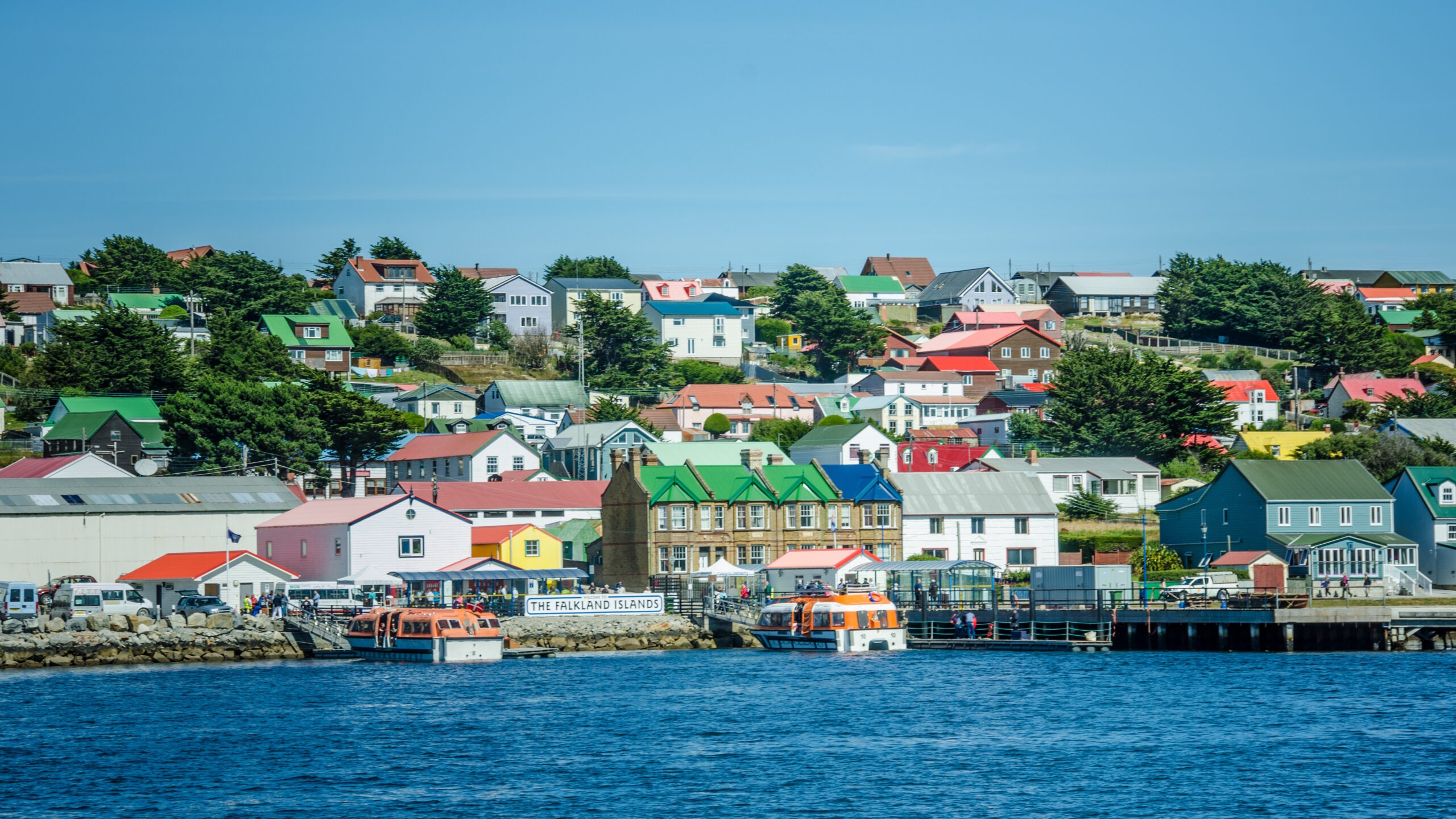
To create a robust digital service for the Falkland Islands, we must recognize that it’s not solely about providing fast global Internet access like Starlink or OneWeb. Unlike St Helena, an undersea cable to the Falkland Islands is not feasible; the Falkland Islands must depend on resilient satellite links. No single service can guarantee resilience; hence, having multiple, distinct ways of accessing the global Internet, such as Starlink and OneWeb, is vital.
Assuming that obtaining Starlink approval and renegotiating Sure’s Exclusive Licence will proceed quickly, a deliverable digital strategy designed to satisfy the needs of all parties involved in the near term is required. It does not have to be complicated.
International Internet Access
Starlink should be allowed alongside Sure’s broadband service. All that needs to be done is for FIG to approve Starlink. This dual setup would offer high-speed global Internet access for those who need it, while those who don’t require fast downloads can continue using Sure’s service. This approach ensures that high-speed Internet access would be available without disrupting existing services.
Domestic Traffic
Creating a local intranet is the essential core of any digital strategy. The intranet, primarily based on terrestrial infrastructure (LTE wireless for Camp and optical fibre in Stanley), could be built and maintained by Sure Falkland Islands. This local network will facilitate efficient domestic communication and services when combined with other policy issues, such as no local traffic quotas. Intranet equipment these days is a commodity product and as cheap as chips.
FIG and Sure RE-Negotiations
Reducing the VSAT license fee shortly would significantly increase Starlink uptake, potentially reducing Sure Falkland Islands’ revenue somewhat. However, opposing this change would not represent ‘good optics’ for Sure getting ready for end of Exclusive Licence negotiations coming soon.
To ameliorate or act as a ‘sweetener’ for the loss of revenue, the Falkland Islands Government (FIG) should request Sure act as a prime contractor with other parties to develop the local intranet (FIG has its own IT department now?) FIG and Sure could jointly finance this project. By doing so, Sure would be compensated for any revenue loss and could offer advanced services to consumers and businesses, increasing revenue beyond just providing commodity transport services. This happened years ago in other countries. I would embrace this opportunity if I were in Sure’s position (and I was in 1992 when I was brought in by Cable & Wireless to ‘fill the gap’ by creating new services to compensate for the loss of telephony revenues). It is disappointing that Sure International, as the monopoly provider, did not propose such an initiative earlier but just stuck with a 90s-style Internet access service and a rather hobbled 4G mobile service.
Conclusion
Developing a forward-looking digital strategy requires substantial in-depth thinking and collaboration among all parties with external help. However, this comprehensive approach is necessary and timely to ensure the digital future of the Falkland Islands. Now is the time to start thinking about building a resilient and inclusive digital infrastructure in the form of an intranet. Sadly, it could have been started quite a few years ago.
If anyone wants to talk to me in more detail about the proposal, please email me at chris@openfalklands.com
Chris Gare, OpenFalklands May 2024, copyright OpenFalklands



I’m quite sure that putting Sure in charge of a domestic intranet would be a terrible idea. Sure would just try to monetize it and in general act against national interests.
On the off chance that anybody with any pull in the FIG reads this, y’all should really look into implementing LibreQoS in the national network.
LibreQoS is free open source software designed to alleviate network issues during congestion and in general improve the end user Internet experience. LibreQoS shares available bandwidth equitably all users and makes the network usable even at 100% utilization. With LibreQoS you can completely do away with crude usage quotas and instead enjoy fair bandwidth sharing. All you need is a $1000 computer and the free LibreQoS software. A single server can handle all the traffic in the Falklands.
You can find out more at their website libreqos.io.
One of the LibreQoS project principals is from the UK. Not only is he a great all around guy, an amazing software engineer, a renowned author in his field and a world travelled lecturer. I’m sure you could invite him to the Falklands for some real expert advice.
Many might agree, but rightly or wrongly Sure is the only game in town at the moment.
True, but there is no need to involve Sure after 2027.
As I’ve noted earlier, it is totally bonkers that Sure is allowed to charge for domestic traffic.
The Falklands should have a local first policy, where as many services as possible are provided locally and what can be duplicated locally using caches and proxies should be. This would take some pressure of international bandwidth.
It is unconscionable that Sure’a incompetence and commercial interests are allowed to override local and domestic interests.
Anybody should be able to build local network and Sure should be obligated to peer with these local networks and data centers without charging.